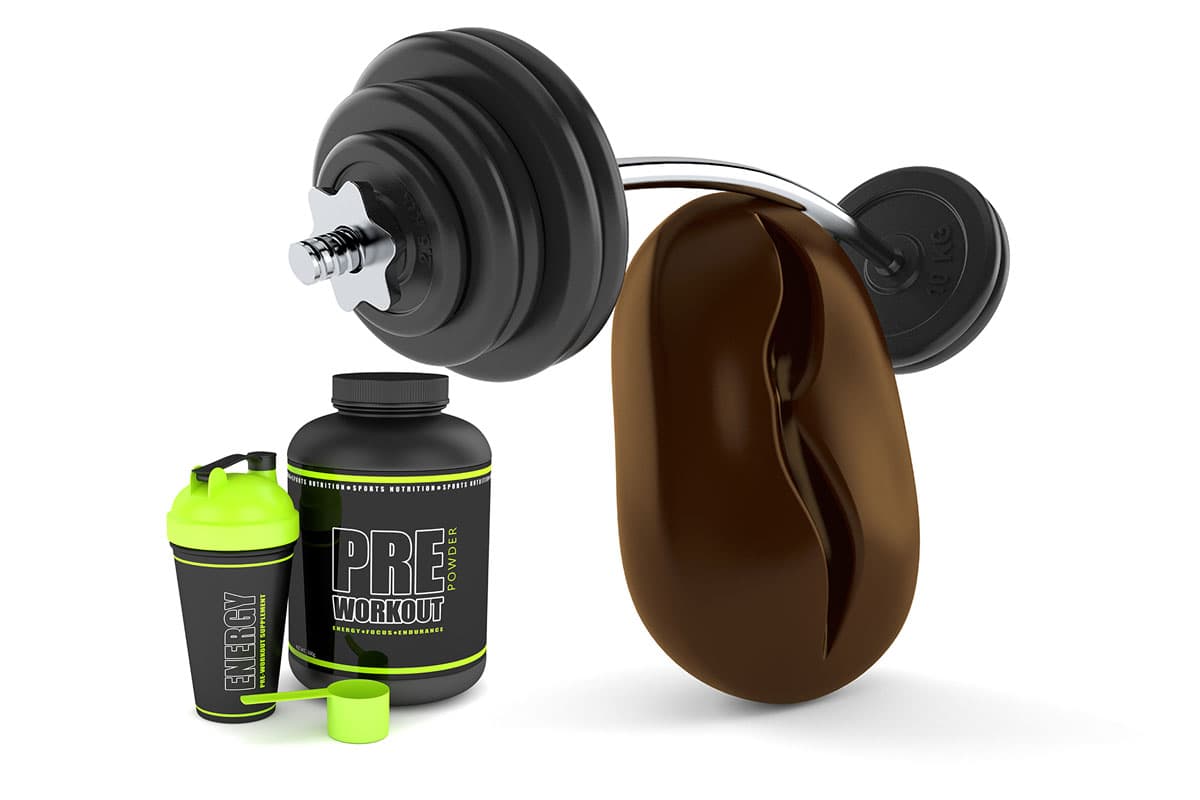Do you ever feel like you need an extra boost before hitting the gym? Well, caffeine may be just what you need! Caffeine is a powerful stimulant found in coffee, tea, and many other drinks and foods.
It can give you the energy to power through tough workouts and help you reach your fitness goals. But did you know that it also has some amazing benefits for your body? In this article, I'm going to tell you all about the awesome benefits of caffeine for workouts.
Have you ever felt like your muscles are too tired to do any more reps? Or that you don't have enough energy to push yourself during a workout? That's where caffeine comes in!
Studies show that drinking a cup of coffee or tea before heading to the gym can actually help improve your performance. Caffeine boosts energy levels and helps reduce fatigue, so it's perfect for athletes who want to get the most out of their workouts.
Caffeine has been proven to increase alertness and focus as well, which makes it great for anyone trying to stay motivated while working out. It can also increase your metabolism, meaning that it will help burn more calories while exercising.
So if you're looking for an easy way to make sure that your workouts are as effective as possible, then adding some caffeine into your routine can make all the difference!
What Is Caffeine?
Caffeine(C8H10N4O2) also known as 1,3,7-Trimethylxanthine is a naturally occurring stimulant found in various plants, including coffee beans, tea leaves, and cocoa beans. It is commonly consumed in beverages such as coffee, tea, energy drinks, and even pre-workout supplements.
It's been around for centuries, with people drinking cups of coffee a day to help them stay alert and energized. Caffeine works by blocking the action of adenosine, a neurotransmitter that promotes relaxation and sleepiness in the brain.
The Food and Drug Administration (FDA) states that up to 400 mg of caffeine per day is safe for adults. That's about four cups of coffee! It's no wonder why so many people rely on caffeine to help them get through their days.
But how does it affect the body? Well, when we consume it, it enters our bloodstream and reaches our brain where it binds to the adenosine receptors that make us feel drowsy. This blocks the feeling of fatigue and gives us an energy boost.
Caffeine also increases adrenaline levels which can make us more alert and focused. Plus, it can give us an extra push during workouts as it helps our bodies burn fat more quickly. It's like giving ourselves an extra boost of energy by using a little bit of magic!
With all these benefits, it's easy to see why so many people use caffeine as a way to stay energized throughout the day or give themselves an extra push during their workouts. So now let's take a look at how caffeine affects the body.
How Does Caffeine Affect The Body?
Now that we know what it is, let's look at how it affects the body. Caffeine is a stimulant drug and it affects the central nervous system. When you drink something with caffeine in it, like coffee or tea, your body absorbs it quickly and goes to work.
The effects of caffeine can be felt within twenty minutes of drinking it and they last for several hours. Caffeine makes us feel more awake, alert, and energetic. It also increases our heart rate and blood pressure.
Caffeine can also give our muscles an extra boost during a workout. That's because when we drink coffee or pre-workout supplements before exercising, our bodies are able to use more oxygen than usual. This helps our muscles work harder and longer during physical activity - making workouts more effective.
There have been studies done on the benefits of pre-workout supplement consumption. Showing that people who drank caffeinated beverages before exercising had better performance than those who didn't consume any at all. These findings suggest that drinking a cup of coffee or tea prior to working out may help you get the most out of your routine!
Pre-Workout Caffeine Consumption
Most pre-workout supplements can be incredibly beneficial for workouts. It helps to increase energy and focus, which is why many athletes consume it before a workout. There are several ways to get caffeine, including drinking a cup of coffee or taking powdered caffeine supplements. Each of these methods has its own advantages and disadvantages that should be considered before consuming them.
Drinking coffee is the most popular way to get a pre-workout boost. Coffee contains antioxidants and other beneficial compounds that can improve overall health. Plus, it's easy to find, relatively inexpensive, and tastes good too! However, since coffee has varying levels of caffeine in each cup, the amount of energy and focus you receive may vary as well.
Powdered caffeine supplements provide a more consistent dose of caffeine than coffee does. Moreover, they are easy to store and transport, making them ideal for athletes on the go. On the downside, they may have some unpleasant side effects such as jitters or upset stomachs if consumed in large doses.
Overall, both coffee and powdered caffeine supplements offer benefits for workouts but come with their own risks too. It's important to consider your needs and lifestyle when deciding which one is best for you before your next workout session. With this information in mind, let's explore how caffeine can improve exercise performance.
Benefits Of Caffeine For Exercise Performance
Now that we’ve discussed pre-workout caffeine consumption, let’s look at the benefits of caffeine for exercise performance. Caffeine-containing beverages are often consumed prior to exercise as they can help improve athletic performance.
Studies have shown that consuming a moderate amount of caffeine (3-6mg per kg body weight) before exercise can help increase energy levels and reduce fatigue. This helps with endurance, speed, and strength during a workout. It also helps to delay muscle fatigue so athletes can work out longer and harder.
Caffeine can also boost alertness and concentration during a workout. Many people rely on caffeine for improved focus when exercising or competing in sports activities. The increased alertness can help athletes stay focused on their goals, which may lead to better performance overall.
Finally, caffeine has been found to improve reaction time and coordination during workouts. Studies have shown that those who consume caffeine prior to exercise experience quicker reactions than those who don't. This is beneficial for athletes who need quick reflexes during games or competitions.
So how much should you consume? It’s recommended that athletes consume 3-6mg of caffeine per kg body weight prior to exercise for optimal results. Going over this amount could cause jitteriness, so it's best to stick within this range. With these benefits in mind, let's look at the effects of caffeine on mental and physical activity.
Effects On Mental And Physical Activity
Boy, do I love having a coffee in the morning! It's like the energizer bunny for my workouts. It makes me feel like I can conquer anything and it helps me power through those tough exercises.
And it's not just me, it can benefit healthy adults who want to improve their physical and mental activity also. Studies show that when taken in moderate amounts, caffeine can help reduce fatigue, increase alertness and focus, and even act as a pain reliever while working out. A cup of coffee or an energy drink with a moderate amount of caffeine content can really make a difference in how you approach your workout.
So basically, if you're looking for an extra boost to get through your workout then having a pre-workout is the way to go! But be sure to watch how much you consume; too much dosage can lead to jitters that might actually hinder your performance. It's all about finding the right balance for your body so you get the most out of your workout experience.
Caffeine is definitely something worth considering if you're looking for ways to push yourself during your workouts. Though it may not be a miracle drug, it certainly has its benefits when used properly by healthy adults. So next time you're feeling sluggish before a workout, maybe reach for some coffee or an energy drink instead of pain relievers!
Now that we've covered the effects on mental and physical activity, let's take a look at some common sources of caffeine.
Common Sources Of Caffeine
Caffeine is widely available and can be found in many foods and drinks. The most popular sources are coffee, tea, soda, energy drinks, chocolate, and certain medications. Coffee is a popular choice for those looking to get an energy boost before a workout.
It contains more concentration than tea and other beverages, so it's a great way to get that extra kick of energy. Tea is also a great source of caffeine and has been used for centuries as a natural tonic to help energize the body.
Soda and energy drinks are also common sources, but the amount contained in these beverages varies greatly depending on the brand. Chocolate also contains some caffeine, but not nearly as much as coffee or tea. Lastly, certain over-the-counter medications contain small amounts as well.
It's important to note that regular consumption of caffeine can lead to withdrawal symptoms if you suddenly stop taking it. Headache, fatigue, and irritability are some of the most common symptoms of withdrawal from caffeine. That's why it's important to limit your intake if you want to avoid these long-term effects.
Now that we know where we can find our caffeine fix, let's take a look at what happens when we consume too much of it...
Potential Side Effects Of Consuming Too Much Caffeine
Ah, caffeine, it's one of the most common sources of energy for workouts. But as with anything, too much is never a good thing. When it comes to caffeine and workouts, it's important to understand the potential side effects of consuming too much.
First off, those looking to optimize their workouts with caffeine should be aware that the American Academy of Pediatrics recommends no more than 100 milligrams of caffeine per day for adolescents and children over twelve years old. Any more than that can lead to irritability, restlessness, anxiety, and insomnia. For adults, the recommended maximum amount is 400mg a day.
Excessive consumption of caffeine can also increase your risk of type 2 diabetes by increasing your body's glucose levels and insulin resistance. In addition, it can lead to dehydration because it acts as a diuretic in your body - meaning you may have to urinate more frequently while exercising. This can make it even harder for you to stay hydrated during an intense workout session.
Finally, studies have shown that high doses of caffeine can disrupt heart rhythms and increase blood pressure levels - both of which are not ideal when working out at a high-intensity level. So if you're looking to get more out of your workout sessions with caffeine, be sure to stick to the recommended daily limit and don't go overboard!
While moderate amounts of caffeine may help improve performance during workouts, it's important to remember that excessive consumption could lead to negative health consequences.
Optimizing Your Workouts With Caffeine
Using caffeine for workouts can be a great way to get an energy boost. It's found in plenty of foods and beverages, so you have lots of options for how to get it!
Here's what you need to know about using caffeine for your workouts:
Benefits
- Improved Performance: This can help you work out longer and harder. You might even see better results over time!
- Increased Energy: Helps give you more energy while working out. You'll feel more motivated and energetic throughout your workout.
Limits
- Over-consumption: Too much dosage can lead to nausea, headaches, and other side effects. Be sure to follow the recommended dosages when using caffeine for workouts.
- Dependency: Taking in too much caffeine on a regular basis could lead to dependency or addiction. Make sure you're not relying on it for your workouts every time!
Knowing the benefits and limits of using caffeine for workouts will help ensure you're getting the most from each session. This way, you can make the most of your time at the gym or wherever else you decide to work out. With this knowledge, let's move on to discussing recommended dosages of caffeine for optimum performance during exercise.
Recommended Dosages
Caffeine is like a superpower for workouts; it can help you get the most out of your exercise routine. However, to make sure you're getting the best results, you need to know how much to take and when. Knowing the right dosages and timing of caffeine consumption can maximize its benefits during workouts.
First, it's important to understand that large amounts of caffeine are not necessary for a good workout. Taking more than 400 mg per day is considered excessive and could lead to negative side effects such as anxiety or jitters.
Instead, stick to smaller doses of around 100-200 mg per workout supplement. This should be enough for most people, but it's always best to consult a doctor before trying any new type of supplement.
Second, timing is key when taking caffeine before working out. Taking the supplement too early on in the day could cause difficulty sleeping later on that night, so try to take it no more than two hours before your workout session.
Additionally, drinking coffee or other caffeinated beverages too close to your workout might cause an upset stomach or other digestive issues due to their high acidity levels.
Finally, if you do decide to use caffeine as part of your workout plan, make sure you listen carefully to your body and adjust accordingly depending on how you feel after taking it. Everyone reacts differently to different types and amounts of supplements so don't be afraid to experiment until you find the right combination for you!
Consuming caffeine at the right time can help boost performance during workouts and maximize its benefits. Timing consumption correctly is essential if you want to get the most out of this powerful supplement!
Timing Consumption To Maximize Benefits
When it comes to working out, timing is everything. If I want to get the most out of caffeine's benefits, then I need to time my consumption correctly. First, I should drink coffee or any other caffeinated beverage around 45 minutes before my workout. This way, the caffeine has enough time to be absorbed by my body and start working its magic!
Second, if I'm looking for a quick boost of energy, I can take a Prothin Brew about 20 minutes before my workout. Prothin Brew Coffe Mix is great because they deliver its caffeine quickly and effectively into your system. Taking one of these before you begin your workout can give you that extra boost of energy you need to push through tough sets and reps.
Third, if I'm planning on drinking coffee during my workout, I should make sure to sip it slowly throughout the session. Sipping coffee slowly helps ensure that the caffeine is released evenly into my body so that I don't crash halfway through my session. It also gives me an excuse to take a break every once in a while!
Finally, if I don't feel like drinking coffee during my workout or taking a pre-workout shake beforehand, there are other options available that can provide the same benefits as caffeine. Moving on from this section, we'll explore those alternatives in more detail...
Alternatives To Caffeine For Workouts
When caffeine isn't an option, there are still other ways to improve your workout. One alternative is to focus on getting enough rest and sleep. Making sure you get a good night's sleep before a workout helps ensure that you're energized and ready to go. This can help you feel better and perform better during your workout.
You can also give yourself a boost of energy by eating healthy snacks before or during your workout. Eating foods high in protein like eggs or nuts, as well as complex carbs like oatmeal or fruit can give you the fuel you need to power through even the toughest workouts.
Another way to enhance your workout is by listening to music or watching videos that help you stay motivated throughout your exercise routine. Music can help keep your energy up and help you stay focused on the task at hand. You may even find that adding some upbeat tunes to your routine helps make it more enjoyable.
Finally, staying hydrated is key to any kind of physical activity. So make sure to drink plenty of water before, during, and after your workout to keep yourself properly hydrated and ready for action. With these alternatives, you'll be able to get the most out of every workout without relying on caffeine for a boost of energy. Now that we've discussed alternatives, let's look at understanding individual responses to caffeine intake.
Understanding Individual Responses To Caffeine Intake
It's important to remember that everyone responds differently to caffeine. Some people may be more sensitive and experience more side effects, while others have a higher tolerance. That's why it's important to understand how your own body responds to caffeine before adding it to your workout routine.
Here are some things to consider when evaluating your individual response to caffeine:
- How much caffeine do you need for the desired effect?
- Are there any adverse effects such as jitters, headaches, or nausea?
- How long does the effect last?
When you first start using caffeine in your workout routine, start with a low amount and gradually increase until you find the right dose for you. This will help minimize any potential side effects and make sure that you get the most out of your workouts. It's also important to pay attention to how your body responds after consuming caffeine and adjust accordingly depending on how you feel.
Finally, understanding how your body reacts to caffeine is an essential part of making sure that it works for you and enhances your workout routine safely and effectively. Moving on, combining supplements with caffeine intake can provide additional benefits for certain types of exercises...
Combining Supplements With Caffeine Intake
I've been talking about the benefits of caffeine for workouts, and now I'm going to talk about combining it with supplements. Taking supplements along with caffeine can be beneficial, depending on what type of workout you're doing.
For example, if you're doing a cardio workout, taking a pre-workout supplement that contains ingredients like creatine or BCAAs can help give you an extra boost of energy. If you're doing a strength training routine, taking a protein supplement can help you build more muscle.
Another thing to consider when combining supplements with caffeine is timing. You want to make sure that your body has time to absorb the nutrients from the supplement before your workout starts. That way, you'll get the most out of it. It's also important to remember that different supplements are absorbed at different rates, so it's best to experiment and figure out what works for you.
It's also important to stay hydrated when combining supplements with caffeine before a workout. Caffeine is a diuretic, so it can make you dehydrated if consumed in large amounts or without water. So make sure that you drink plenty of water during your workout to keep yourself hydrated. And when it comes to nutrition, having something light like an energy bar or piece of fruit before your workout can give your body the fuel it needs for an effective session.
Taking all these factors into consideration will ensure that you get the most out of your pre-workout supplementation and maximize your results in the gym. Moving on, let's look at how hydration and nutrition play into taking caffeine before a workout.
Hydration And Nutrition When Taking Caffeine Before A Workout
As the old saying goes, "you are what you eat!" This is especially true when it comes to exercise and working out. When considering taking caffeine before a workout, hydration, and nutrition are key components to consider.
Hydration
- It's important to stay hydrated during any physical activity, especially when taking caffeine.
- Drinking plenty of water is essential for keeping your body functioning properly.
- Dehydration can lead to dizziness, fatigue, and headaches, so it's important to make sure you're drinking enough fluids throughout the day.
Nutrition
- Eating a balanced diet with plenty of fruits, vegetables, and healthy proteins can help fuel your workout and provide energy for the duration of your exercise routine.
- Taking caffeine before a workout can help you push harder in your workouts and get better results, but it should be accompanied by proper nutrition as well.
- It's also important to note that if you take too much caffeine before exercising, it could lead to dehydration or other health issues such as increased heart rate or nervousness.
When combining it with proper hydration and nutrition, will provide the best outcome for any workout program. With the right combination of these three elements working together, you can maximize the benefits of caffeine while avoiding any potential side effects that may occur from consuming too much of it. Therefore, it’s important to understand how these factors work together in order to get the most out of your workouts!
Frequently Asked Questions
Are There Any Long-Term Health Risks Associated With Caffeine Consumption?
There are some potential risks when it comes to drinking large amounts. Consuming too much caffeine can cause jitteriness, restlessness, and headaches. It can also lead to problems like insomnia and anxiety if not used in moderation. On top of this, high levels of caffeine consumption have been linked to an increased risk of heart disease over time.
That said, moderate levels of caffeine consumption have been found to be beneficial for many people. It can improve alertness and focus while helping to reduce fatigue during physical activity or workouts. This is why so many athletes rely on caffeinated drinks as part of their training routine.
Overall, it's important to remember that everything should be consumed in moderation - including caffeine! If you stick with low-to-moderate doses then you should be able to reap the benefits without any major health concerns down the line. So enjoy your coffee or energy drink responsibly!
What Is The Maximum Recommended Daily Dose Of Caffeine?
I'm sure we've all heard of the benefits of caffeine for workouts. But have you ever thought about how much is too much? What's the maximum recommended daily dosage?
To start, it's important to know that too much caffeine can cause unpleasant side effects like jitters, headaches, and trouble sleeping. So, when it comes to finding the right amount for you, here's what you need to know:
- The American Academy of Pediatrics recommends no more than 100mg per day for children ages 4-6
- The American Heart Association suggests no more than 450mg per day for adults
- The Mayo Clinic recommends 400-500mg a day for healthy adults
- And pregnant women should limit their intake to 200mg or less per day
It's also important to remember that even if you're taking in less than the recommended dosage, your body may react differently depending on your weight and age. So be sure to check with your doctor before increasing your intake. Other things like medications or pre-existing conditions could affect how your body metabolizes caffeine as well.
And one last thing - keep in mind that some energy drinks contain up to 200-300mg of caffeine in a single can. So if you're drinking those regularly, it could be easy to go over the recommended dosage without even realizing it! That’s why it’s always best to watch your intake and make sure you don't exceed the safe limits set by medical professionals.
What Are The Best Alternatives To Caffeine For Workouts?
If you're looking for an alternative to caffeine for workouts, there are a few options that can give you the same level of energy without the potential risks. It is often used as an aid for workouts, but if you consume too much it can have negative effects. So, what else can you do? Let's take a look at some of the best alternatives to caffeine.
Here are a few things to try:
- Green tea: Green tea contains caffeine, but in much lower amounts than coffee or energy drinks - plus it has added antioxidants and vitamins.
- Coconut water: This natural drink is packed with electrolytes and other nutrients that help keep your body energized during exercise.
- Tart cherry juice: This juice contains compounds that may reduce muscle soreness and improve recovery time after exercising.
One way to use these alternatives is by drinking them before and after your workout routine. For instance, green tea can help boost your energy in the morning and tart cherry juice can help replenish your body’s electrolytes after a tough workout session. You should also be sure to stay hydrated with plenty of water throughout the day!
These alternatives may not give you the same jolt of energy as caffeine does, but they will still provide some benefits and help keep your body healthy while still giving you enough energy for working out. And because they don't contain high levels of caffeine like coffee or energy drinks, they won't cause any adverse reactions. So give them a try - your body will thank you!
Are There Any Medical Conditions That Would Prevent Someone From Taking Caffeine Before A Workout?
Taking caffeine before exercise can be beneficial, but it can also be risky for some people. Before you decide to use caffeine for your workouts, you should make sure it's safe for you.
The first thing to do is check with your doctor if you have any medical concerns. Certain conditions like high blood pressure or heart disease could be made worse by taking caffeine. Your doctor will let you know if it's OK to take caffeine before exercising or not.
It's also important to pay attention to how much caffeine you're taking in each day. Too much caffeine can cause some unpleasant side effects like headaches and fatigue, so it's best to keep your intake at a reasonable level. Make sure that any energy drinks or supplements you're using don't contain too much of this stimulant.
Finally, if you're pregnant or breastfeeding, it may be better to avoid caffeine altogether. Even small amounts of this substance can pass through the placenta and into the baby’s bloodstream, and while there isn't enough research yet on how this affects babies in the long run, it’s best to play it safe and go without it during these times.
So whether you should take caffeine before a workout depends on several factors: your overall health, how much of the stimulant is already in your system, and whether or not you're pregnant or nursing. It’s always best to talk with your doctor first before deciding what’s right for you!
Is It Safe To Combine Caffeine With Other Supplements?
When it comes to combining caffeine with other supplements, it's important to understand the potential risks. While it can provide a boost for workouts, it's not always safe to combine it with other supplements.
First of all, you should check with your doctor about any medications or herbal remedies that you are taking before using caffeine. Some medicines might interact with caffeine and cause side effects like headaches or nausea. Additionally, some supplements might interfere with the absorption of caffeine in the body which could lead to an increased risk of adverse reactions.
It's also important to look at the amount of dosage in the supplement you are using. Caffeine can be found in many different forms like coffee, tea, energy drinks, and even chocolate bars. It is recommended that adults shouldn't consume more than 400mg of caffeine per day. So if you're taking a caffeinated supplement as well as drinking caffeine or tea or eating chocolate then you should take this into consideration when calculating your total daily intake.
Finally, too much dosage can lead to negative effects such as restlessness, jitteriness, and insomnia so make sure that you're not overdoing it when combining different supplements containing caffeine. Be aware of your body's reaction so that you can adjust your intake accordingly and enjoy all the benefits that come with working out while still staying safe!
Conclusion
In conclusion, caffeine can be a great way to get an extra boost of energy before a workout. However, it is important to understand the potential risks associated with caffeine consumption, as well as the maximum recommended daily dose.
It is also important to be aware of any medical conditions that could prevent someone from taking too much before a workout. Lastly, it is essential to consult with a healthcare professional before mixing caffeine with other supplements.
Overall, if used responsibly and in moderation, caffeine can provide numerous benefits for those who are looking for an extra edge in their workout routine. With its ability to increase alertness and focus, caffeine can help people make the most out of their workouts. And because it is widely available and affordable, it's an easy addition to anyone's exercise regime.
So if you're looking for an effective way to reignite your motivation and power through your next workout session, consider giving our pre-workout supplements a try - just be sure to stay within recommended doses and consult your doctor if needed!







Hi Team,
i am Ajay from Delhi India...